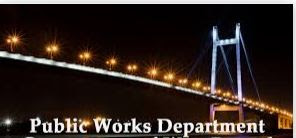Functions
of Officers of PWD (Public Works Department)
Services of Public Works Department:
The district
administrators, head of departments, municipal organizations whenever require
to executive construction projects, seek the services of Public Works
Department. The PWD officers either independently or by becoming the members of
the constituted committees for construction works; helps the organizations in
their construction works. Such deployment of Executive Engineers (XENs) is
usually done after seeking the permission of Engineer-in-Chief (EIC) and the
department charges the organizations for the services of the engineers. The
District Administration undertakes the works from PWD officers with giving
written orders and the same is also communicated with the EIC. Apart from
construction works, the officers of Public Works Department may also be connected
for consultancy services including inspection of roads, buildings, irrigation
works etc. The consultancy charges, inspection fees are charged as per the
records at upper level i.e. through Administrative Secretaries of the concerned
department. The Public Works Department is considered as approved source and
without No Objection Certificate (NoC) from the PWD, the construction works
cannot be assigned or completed from the contractors available in open market.
Records Management:
Like other government
organizations, the Public Works Department also maintains the records in
systematic way at all locations. The records are weeded out as per records
retention schedule applicable on government organizations. In case of old
records which cannot be destroyed and considered as valuable records, such
records are transferred to the department of archives.
How the Public Works Department Functions?
The EIC prepares an
annual plan of action and conveys the same to all chief engineers working under
his supervision for effective implementation of the plan. According to annual
plan, the budget is proposed to the finance department by the Budget
Controlling Authority (BCA) i.e. Engineer-in-Chief (EIC). The EIC delegates
powers to the Chief Engineers and the Chief Engineers delegates powers to the
Superintending Engineers located at various field offices for smooth conduct of
the works. The status of each work is monitored through Geographical
Information System (GIS) and Management Information System (MIS). The
procurement of goods and services is done through e-tendering and Government
e-Marketplace (GeM). Assets and stores are maintained and subject to audit on
annual basis. In order to ensure proper compliance of financial rules in maintenance
of assets and stores, utilization of funds, each divisional office has an
officer known as Divisional Accounts Officer (DAO). The DAO ensures the compilation
of records with Accountant General’s records with are derived from the
treasuries department. Every year the EIC prepares an Annual Administration
Report (AAR) and send the same to the state government. The functions of each
officer are detailed in the code of the Public Works Department available on
the website of the department.
Detailed Project Report:
The PWD Engineers are
usually contacted by the organizations to prepare Detailed Project Report (DPR)
of roads, buildings, water projects, irrigation projects etc. The project is assessed
technically and financially and first of all, feasibility study is carried out
to determine whether the project is worth enough to execute or not. Secondly, a
preliminary project report (PPR) is prepared stating general activities to be
carried out in a particular project. Thereafter, detailed project report (DPR)
is prepared with all activities to be carried out in the project. The
preparation requires surveys of the work, estimation of each activity to be
carried out for effective execution of the project.
Contracts of Public Works Department:
The department engaged
the contractors either by making lump sum payment for various types of activities
to be carried out in a project or through other modes like Turnkey contracts,
Build-Operate and Transfer (BOT) contracts, Build-Operate-Own and Transfer
(BOOT) contracts, or Operate-Maintain and Transfer (OMT) contracts. In lump sum
contact, the contractor is responsible for doing all the activities detailed in
the contract in lieu of a consideration. In Turnkey contact, the contractor is
responsible firstly to survey and investigate the site, prepare the design of
the work, do engineering and construction activities, and commissioning of the
project. In BOT contract, the contractor firstly builds and operate the work
including bridges, flyovers, bypasses, roads etc. and then transfer its
ownership after a specific period of time to the Government. During the period
before the transfer of ownership, the contractor is allowed to recover the cost
and reward of his function in the form of toll charges to be collected from the
users. In BOOT contract, the contractor is also allowed to own the assets of
the work for a specified time period. In OMT contract, the construction work is
firstly carried out by the government thereafter the operation and maintenance
is under the contractor. (Continued to... How PWD Works?)
*Copyright © 2018 Dr. Lalit Kumar. All rights reserved. 













